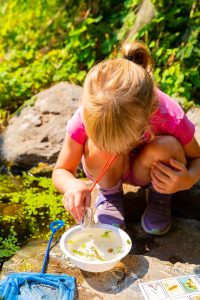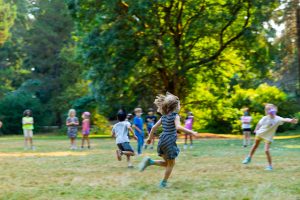Population Health News · May 30, 2024
Featuring Pooja Tandon, Nature and Health Research Collaborative member
 Engaging in outdoor play and exploration can significantly enhance a child’s physical health and mental well-being. However, not all children and families have equitable access to safe, green environments. This deprivation of nature can be tied to several factors, including systemic racism and economic disparities, and hinder a family’s ability to access nature and reap its health benefits. A new program, titled “Project Nature,” seeks to help families overcome barriers so that all children can connect with nature and lead healthier lives.
Engaging in outdoor play and exploration can significantly enhance a child’s physical health and mental well-being. However, not all children and families have equitable access to safe, green environments. This deprivation of nature can be tied to several factors, including systemic racism and economic disparities, and hinder a family’s ability to access nature and reap its health benefits. A new program, titled “Project Nature,” seeks to help families overcome barriers so that all children can connect with nature and lead healthier lives.
An initiative of BestStart Washington, Project Nature aims to engage children in nature-rich play starting early in life. This tool is designed for caregivers who may have limited access to outdoor recreation opportunities and connects families with resources on how to incorporate active outdoor nature time into children’s play via a brochure, online resources and an age-appropriate nature toy
After field tests in local Puget Sound clinics, the toolkit has shown early success in increasing physical activity and time spent in nature for children aged 4-10 years old. In a pivotal step toward extending the impact of Project Nature, Dr. Pooja Tandon was awarded a Tier 3 Population Health Initiative Pilot Grant to scale the Project’s work in spring 2023.
 With a lack of summer sunshine, the ongoing days of winter and frigid temperatures can leave families and children feeling stuck indoors. However, it’s important to get outside, no matter the weather.
With a lack of summer sunshine, the ongoing days of winter and frigid temperatures can leave families and children feeling stuck indoors. However, it’s important to get outside, no matter the weather. It’s a good idea to get children outside every day, but especially on Kids to Parks Day, a national day of outdoor play on May 21.
It’s a good idea to get children outside every day, but especially on Kids to Parks Day, a national day of outdoor play on May 21.
 Getting outside as a family is a great way to spend time together. But what can you do outdoors while staying a safe distance from others during the COVID-19 pandemic? Think nature exploration!
Getting outside as a family is a great way to spend time together. But what can you do outdoors while staying a safe distance from others during the COVID-19 pandemic? Think nature exploration! Kids today spend less time outside than any previous generation. That’s probably not a surprise — we live in a world filled with big screens, small screens, screens that attach to your wrist and screens that attach to your face. When combined with factors like busy lifestyles, shrinking access to natural spaces and parks, schools cutting opportunities for outdoor play, and neighborhoods that may not feel safe, it’s no wonder most children fall well short of the daily recommendation of 60 minutes of outdoor play.
Kids today spend less time outside than any previous generation. That’s probably not a surprise — we live in a world filled with big screens, small screens, screens that attach to your wrist and screens that attach to your face. When combined with factors like busy lifestyles, shrinking access to natural spaces and parks, schools cutting opportunities for outdoor play, and neighborhoods that may not feel safe, it’s no wonder most children fall well short of the daily recommendation of 60 minutes of outdoor play. “I would encourage people to get out regardless of weather. Even just getting your steps in can be especially important on days that are gray and cold, since physical activity is important for both mental and physical health,” says Pooja Tandon, M.D., an assistant professor of pediatrics at the University of Washington School of Medicine who studies the relationship between physical activity and children’s health.
“I would encourage people to get out regardless of weather. Even just getting your steps in can be especially important on days that are gray and cold, since physical activity is important for both mental and physical health,” says Pooja Tandon, M.D., an assistant professor of pediatrics at the University of Washington School of Medicine who studies the relationship between physical activity and children’s health. We know that outdoor play improves kids’ physical health. All that fresh air and exercise — what’s not to like? The truth is, there actually may be more to like. Outdoor play is increasingly linked scientifically to stronger mental muscle.
We know that outdoor play improves kids’ physical health. All that fresh air and exercise — what’s not to like? The truth is, there actually may be more to like. Outdoor play is increasingly linked scientifically to stronger mental muscle.